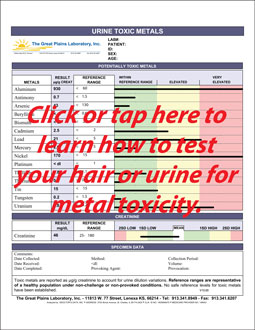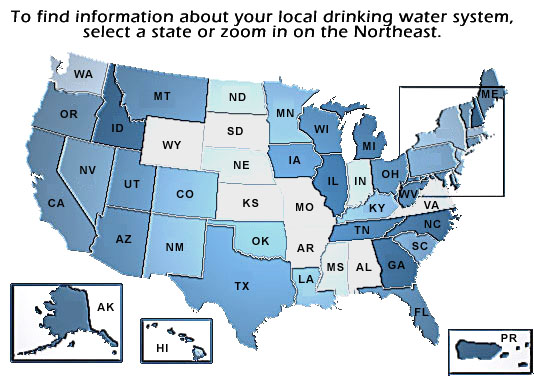
Information, Tests and Solutions to Improve
Your Health and Water Quality |
|||||||||||||||||||||||||||||||||||||||
Arsenic Toxicity and Arsenic PoisoningArsenic is absorbed from drinking and eating food cooked in contaminated water and through the skin. |
|
Nausea |
Vomiting |
|
Stomach pain |
Diarrhea |
|
Kidney damage |
Diabetes |
|
Liver damage |
Abnormal heart rhythm |
|
Birth defects |
Spontaneous abortions |
|
Cardiovascular disease |
Reproductive problems |
|
Darkening of the skin |
Lower IQ levels in children |
|
Partial paralysis |
Blindness |
|
Low platelet count |
Numbness of hands and feet |
|
Damage to blood vessels |
Decreased red blood cell count |
|
Decreased white blood cell count |
“corns” or “warts” on the palms, soles and torso |
|
Sensation of pins and needles in hands and feet (neuropathy) |
Thickening, redness, itching, rash or swelling of the skin |
Long term arsenic toxicity and arsenic poisoning increases the risk of several cancers including:
|
Skin cancer |
Lung cancer |
Liver cancer |
|
Bladder cancer |
Kidney cancer |
Nasal passage cancer |
|
Prostate cancer |
|
|
 The Department of Health and Human Services (DHHS), International Agency for Research on
Cancer (IARC) and the EPA have determined that inorganic arsenic toxicity is a known human
carcinogen.
The Department of Health and Human Services (DHHS), International Agency for Research on
Cancer (IARC) and the EPA have determined that inorganic arsenic toxicity is a known human
carcinogen.
High dose, short term, exposure to Arsenic will cause death.
Arsenic is a naturally occurring element widely distributed in the earth’s crust. It is odorless and tasteless. It enters drinking water supplies from natural deposits in the earth or from agricultural (runoff from orchards) and industrial practices (runoff from glass & electronic production wastes ).Arsenic was used in pressure treated chromated copper arsenate (CCA) wood prior to December 31, 2003. Arsenic is absorbed from drinking and eating food cooked in contaminated water and through the skin.
There is some evidence that inhaled or ingested arsenic can injure pregnant women or their unborn babies, although the studies are not definitive. Studies in animals show that large doses of arsenic that cause illness in pregnant females, can also cause low birth weight, fetal malformations, and even fetal death. Arsenic can cross the placenta and has been found in fetal tissues. Arsenic is found at low levels in breast milk.
There is some evidence that long-term exposure to arsenic in children may result in lower IQ scores. There is also some evidence that exposure to arsenic in the womb and early childhood may increase mortality in young adults.
The urine is the most reliable test for arsenic exposure within the last few days. Tests on hair and fingernails can measure exposure to high levels of arsenic onver the past 6-12 months. Arsenic may have an affinity for hair. Thus hair samples may give falsely elevated results. These tests can determine if you hae been exposed to above-average levels of arsenic. They cannot predict whether the arsenic levels in your body will affect your health.
EPA has set the arsenic standard for drinking water at .010 parts per million (10 parts per billion) to protect consumers served by public water systems from the effects of long-term, chronic exposure to arsenic. Arsenic toxicity in the body can increase with time and exposure. The rate of arsenic intake can exceed the rate of elimination from the body. [3]
Cardiovascular Disease
Cardiovascular disease is the leading cause of death worldwide. Chronic arsenic poisoning may be persistent and/or
irreversible. Arsenic induced cardiovascular disease may result from the interaction among genetic, environment and
nutritional factors.
[4]
[5]
Chronic arsenic poisoning through ingestion of arsenic-contaminated water is associated with various cardiovascular diseases including:
|
Atherosclerosis |
High blood pressure |
Stroke and Heart attack |
|
Impaired electrical conduction in the heart |
Peripheral vascular disease (aka peripheral artery disease) |
Impaired small blood vessel circulation |
World Health Organization Statements
· Increased risks of lung and bladder cancer and of arsenic-associated skin lesions have been observed at drinking-water arsenic concentrations of less than 0.05 mg/L.
· Immediate symptoms on an acute poisoning typically include vomiting, esophagus and abdominal pain, and bloody "rice water" diarrhea.
· The symptoms and signs that arsenic causes appear to differ between individuals, population groups and geographic areas. Thus, there is no universal definition of the disease caused by arsenic.
· Following long-term exposure, the first changes are usually observed in the skin: pigmentation changes, and then hyperkeratosis. Cancer is a late phenomenon, and usually takes more than 10 years to develop. [6]
Skin Absorption
Dermal absorption during showering and hand washing can
be an important exposure route if the water contains more than 100 mcg/L As(III) or As(V). Cell changes, cell death
associated with disruption of the cell membrane, and inhibition of DNA and protein syntheses occur at As(III)
exposure doses as low as 10 mcg/L.
[7] One to 6.4% of arsenic applied to the
skin or during bathing is absorbed and eliminated through the kidneys.
[8]
EPA standards for Arsenic Levels in Water
Health-based, non-enforceable Maximum Contaminant Level Goal (MCGL) of 0.0.
Enforceable Maximum Contaminant Level (MCL) 0f 0.01 mg/ml (10ug/L) (10mcg/L) (10ppb).
How to test your body for Arsenic Toxicity:
How to test water for Arsenic Toxicity: WaterCheck Test
Recommended Arsenic Toxicity Water Treatment: [9]
-
Reverse Osmosis
-
Distillation
-
Activated Aluminum Absorption
This is not an all-encompassing metal toxicity list. There are other sources of metal exposure not listed herein.
References
[1] http://www.atsdr.cdc.gov/tfacts2.html
[2] http://www.epa.gov/OGWDW/arsenic/
[3] National Toxicology Program (http://ntp.niehs.nih.gov/)
[4] Risk of carotid atherosclerosis associated with genetic polymorphisms of apolipoprotein E and inflammatory genes among arsenic exposed residents in Taiwan . Hsieh YC, Hsieh FI, Lien LM, Chou YL, Chiou HY, Chen CJ. Toxicol Appl Pharmacol. 2008 Feb 15;227(1):1-7.
[5] A review of the epidemiologic literature on the role of environmental arsenic exposure and cardiovascular diseases. Wang CH, Hsiao CK, Chen CL, Hsu LI, Chiou HY, Chen SY, Hsueh YM, Wu MM, Chen CJ. Toxicol Appl Pharmacol. 2007 Aug 1;222(3):315-26.
[6] http://www.who.int/mediacentre/factsheets/fs210/en/index.html World Health Organization
[7] Effects of arsenic on human keratinocytes: morphological, physiological, and precursor incorporation studies. Bernstam L, Lan CH, Lee J, Nriagu JO. Environ Res. 2002 Jul;89(3):220-35.
[8] In vivo and in vitro percutaneous absorption and skin decontamination of arsenic from water and soil. Wester RC, Maibach HI, Sedik L, Melendres J, Wade M. Fundam Appl Toxicol. 1993 Apr;20(3):336-40.
[9] National Testing Laboratories Corrective Action Brochure
Return from Arsenic Toxicity and Arsenic Poisoning to Water Quality and Toxicities.
Quality Water Testing and Analysis for Residential and Commercial Water Sources
My Mission
Provide you with accurate information, economical and
effective tests
and products to evaluate your body and water for toxic metals and remove them if
necessary.
Keith D. Bishop
Clinical Nutritionist
B.Sc. Pharmacy
Health
Coach©

|
*These statements have not been evaluated by the Food and Drug Administration. These products are
not intended to diagnose, treat, cure or prevent any disease.
The information and contents of this website are based upon government, medical,
university and health industry research information.
Consult with your physician or a qualified health care provider before making any changes in your medical or
treatment program.
Please let us know if you have problems viewing anything or ordering on this page:
Thank you for visiting www.ToxicWaterSolution.com! If you find this information helpful or
interesting please send a link to your family and friends.
Copyright © 2007-2016 Natural Care Solution, LLC Keith D. Bishop, Clinical Nutritionist, B.Sc. Pharmacy








